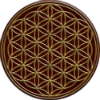5 ways to press back
It used to be called melancholy, which means having black bile. If a body fluid is black, that means to say it is stagnant--in the parlance of the previous post, the habit has become a straitjacket. Melancholy isn't bittersweet, slightly poetic, verklempt self-indulgence. If your liver's squirting out black bile, or your gallbladder's storing black bile, things are in bad shape.
Depression, though. The solution's suggested in the name. In fact, the name suggests that you're already solving it.
Written by Ela Harrison
on Friday, 12 June 2015.
Posted in WholeHealth, All About Words, Mindfulness
"good morning, heartache"
Day dwindles into night, and we notice it. Night breaks into day, and we feel the birds winding up for their chorus.
No one can be immune to the accelerating daylength shift--lengthening here, shortening south of the Equator--toward the solstice. We notice, we recognize. It's like a habit that pre-exists us. Habit, in the original sense of a garment or costume (which means "custom") that we slip into, familiar attire.
But, since we make our own weather, sometimes just the right combination of triggers will trip an old circuit, an old path you've allowed to grow over with weeds is suddenly under your feet again.
Paths and orbits exist for lifetimes; weeds, persistent as they are, are nonetheless ephemeral.
Written by Ela Harrison
on Thursday, 11 June 2015.
Posted in WholeHealth, Mindfulness
context and system can be more than the object itself
There are at least two more things I didn't mention in comparing the "herb" system and the "drug" system of using substances to bring about healing in bodies.
The two I have in mind both turn out to be relevant to today's specific example. These are:
money and tradition of use.
Written by Ela Harrison
on Sunday, 07 June 2015.
Posted in WholeHealth, Ecological, Herbs and Plants
it's all medicine
In the last post, I offered that despite what we believe (placebo/nocebo) about an herb/drug (or anything else), it does have a characteristic effect (actio) for the most part. And I who am saying this am an unapologetic magical thinker.
Despite my strong belief that belief (conscious or not) shapes experience, my experience has also been, e.g., that taking a big glug of passionflower tincture because I grabbed the wrong (and unlabeled) bottle made me catatonic in short order (and then I had to figure out what happened), and that a scoop of a BCAA product with whey not listed on the label (I believed was whey-free) led to rapid, unwelcome psychosis as whey reliably does for me.
Beliefs about herbs/drugs are influenced by contexts and systems too. And I'm a good candidate to speak to this, since I study and use herbs but also take meds that come in red plastic bottles from the pharmacy.
Written by Ela Harrison
on Friday, 05 June 2015.
Posted in WholeHealth, Herbs and Plants
our bodies are neither garbage cans nor cars
Placebo, nocebo, actio--the first two words of this Latin trio are verbs; the third is a noun.
"I will please, I will harm, action."
Note: although the current sequence of posts isn't following the "tripartite spell" format established a month or two ago, the notion of the spell--the combination of word- and plant-lore--as basis for how I structure my thoughts is still very salient.
I've been thinking a lot about what it is to be conscious of what we put in our bodies--several posts to come on that. You might expect me to praise the placebo/nocebo effects, subsets of the Law of Attraction. But in fact, I want to point out that chalking everything up to placebo/nocebo can be dangerous.
Written by Ela Harrison
on Sunday, 31 May 2015.
Posted in WholeHealth, Herbs and Plants
"wherever I go, here I am'
On Monday, I accompanied my dear spirit-brother M. to Santa Fe! We got home last night (Wednesday) around 1am, having put over 1100 miles on his trusty trooper of a car, having experienced awe-inspiring (and awe-ful and inspiring) natural and manmade beauty through all our senses, having experienced non-beautiful aspects of nature and man also, and having recognized that this, too, is part of the beauty that is existence.
This lady pictured, in her Egyptian-esque skirt, is a ponderosa-tall witness on the side of the highway through Malpais National Monument. Always watching, if we care to notice.
My primary role for this trip was as witness to M. as he checked out the school program and the place that might be--that, turns out, surely will be--host to the next stage in his unfolding. However, I had also to witness myself witnessing, and to see myself, normally a singleton, in constant company for three days.
Written by Ela Harrison
on Thursday, 28 May 2015.
Posted in Blogging, WholeHealth, Mindfulness
four ways to "seek and ye shall find"
My previous post on questions was lyrical and didn't go into practicalities. I notice that interviewees on podcasts and telesummits, etc., respond "Good question," almost reflexively, to every question asked, so that "good question" is about as bleached of meaning as other fillers and time-buyers like "I mean," "you know," "like."
But the truth is, formulating a good question is part of seeing what you believe. A good question, in a sense, creates a possible world in which its answer exists. "Seek, and ye shall find" means "the types of questions you ask, and the way you ask them, will impact the quality and specificity--and even the fact-icity--of the answer." A question is a key to a lock, is a heat-seeking missile, is a ladder to a glass ceiling.
Written by Ela Harrison
on Saturday, 23 May 2015.
Posted in WholeHealth, Mindfulness






